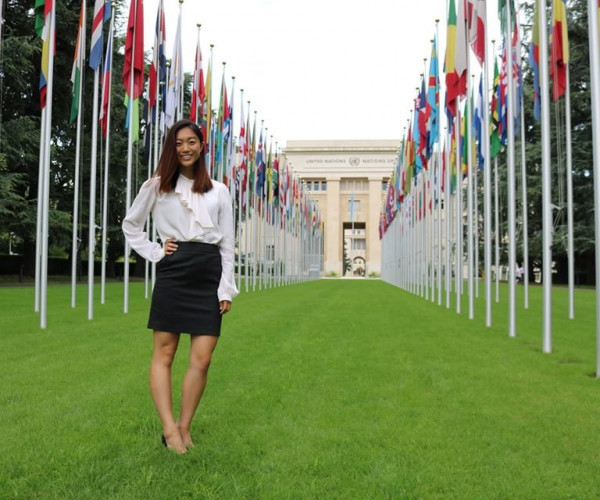Pathways to the Profession: Leah Wong L’18
Editor’s Note: Each summer Penn Law students hone their skills through a wide array of private and public sector internships across the country and around the world. Generous financial support and fellowships for international and public interest work enable students to pursue diverse assignments in the United States and abroad. This dispatch from Leah Wong L’18 is one in a series of firsthand accounts by Law School students about how their summer employment opportunities are preparing them for their legal careers. Wong is from Arcadia, California. She attended the University of California, San Diego where she majored in Political Science and double minored in Business and Law & Society and as a student at Penn Law serves as the president of the American Constitutional Society. Before law school she served in AmeriCorps VISTA with the San Diego District Attorney’s Office and directed a production of the Vagina Monologues as a part of a global movement to end violence against women and girls. After law school, she hopes to gain experience in regulations, international trade, investment and arbitration, anti-corruption compliance, and pro bono work in human rights and civil rights.
Over a year ago, I sat at Penn Law’s Admitted Students Weekend, my eyes wide with amazement as one student, now one of my personal role models, spoke about her 1L summer experience at the United Nations. What seemed like a far-fetched aspiration became a possibility and then became a reality — all of because of the Penn Law International Programs Office and network. It has been a great privilege to be an International Human Rights Fellow at the Office of the U.N. High Commissioner of Human Rights this summer, growing both professionally and personally while contributing to the advancement of human rights abroad.
Sandwiched between the Middle East North Africa team and Americas team, I work with the Asia-Pacific Region team — monitoring and engaging with 38 countries on human rights issues, standard-setting, and implementation on the ground. As a part of a collaborative team where no assignment is ever quite the same, I’ve learned about countries ranging from Iran to Cambodia. My previous experiences in civil and human rights had been focused on certain themes or constituent groups, so being able to experience the full, complex range of issues facing other nations has provided me with both a steep learning curve and endlessly fascinating work days.
Although I can’t disclose the specific, confidential content of my work this summer, I can gratefully say that I’ve substantively worked with the myriad mechanisms the U.N. employs to keep member-states accountable and in constant pursuit of improving human rights. For some of my assignments, I’ve researched, drafted, and edited Secretary-General reports to the U.N. General Assembly and Human Rights Council, submitted informal contributions to treaty body committees, and analyzed new member-state laws and developments for compliance with international human rights law.
Each unique experience thus far gives life to the lessons I started during the school year. I studied the U.N. Convention on the Law of the Sea for my international law final, and happened to be on the phone with the Philippines regional office when the international tribunal decided in favor of the Philippines regarding rights to the South China Sea. I had synthesized facts and international law for my International Human Right Advocates pro bono research project, and I realized the importance of that skill when drafting Special Procedure appeals to foreign governments on human rights allegations. While I practiced effective communication in mock simulations of oral advocacy, negotiations, and client counseling in Legal Practice Skills, I was utilizing those skills real-time in meetings with direct victims of human rights violations, human rights lawyers, civil society organizations, foreign ambassadors, permanent missions, and other U.N. agencies.
Yet, the most valuable take-away from this summer will be the relationships I made with the individuals at the U.N. I feel privileged every day to work with a team of human rights officers who impress upon me not only life-lessons through mentorship, but also conviction and compassion through friendship. Each of their diverse life journeys have taken them between the private sector and public sector, between the field in developing countries and international agencies. Their lessons of embracing passion, integrity, and differences, as well as the belief that I can always serve others, striving for, but not ever feeling entitled to, success will stay with me forever. From my fellow interns, I learned new words in countless languages and that my generation is stepping up to affect change in varying ways. And even the higher-level officials at the U.N. exuded an openness and humility that only comes with those admirable enough to make universal human rights a career.
The streets of Geneva are lined with over 100 different international organizations among the sweet, but dynamic, local Swiss community. With over a fifth of the city’s population being foreigners, you hear everything from French to Korean to the Portuguese screams of joy after a World Cup win. But most palpable of all is the optimism and drive of entire institutions and the people who fill them, a testament to the ideals most people are cynical about in these trying times: world peace and security, sustainable development, and universal human rights. That self-assured, inextinguishable sense of purpose and work ethic inspires and translates to any walk of life — I’m lucky to have had the opportunity to embody those values and continue to do so in my own.
- Leah Wong





